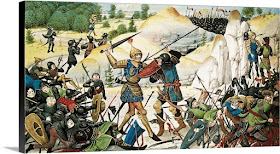Sulayman al-Arabi, the Abbasid-preferring governor of Barcelona, sent a message to Charlemagne in 777, offering his submission to Charlemagne's rule if he could get military aid against the Umayyad emir of Córdoba, Abd ar-Rahman I. Sulayman had allies: Husayn of Zaragoza and Abu Taur of Huesca. Charlemagne was all too happy to bring an army south to reconquer territory from Muslims.
Reaching Barcelona, Sulayman welcomed him, and their two armies marched next to Zaragoza to add Hosayn's military forces. Reaching Zaragoza, however, they found that Husayn would not allow them into the walled city. He had just recently defeated Abd ar-Rahman's general and taken him prisoner. Husayn was willing to rely on his own power to deal with further Umayyad threats, and no longer was willing to risk his autonomy being usurped by a Christian ruler.
Charlemagne settled into a siege of Zaragoza. After more than a month, however, an agreement was made: Husayn would pay Charlemagne some gold to go away. This he did, but on his way back north Charlemagne decided to make an example of the Basques, whom he suspected of being allied with the Moors. He spent some time destroying villages, tearing down the walls of Pamplona, and setting up his own garrisons. Satisfied, he set off for home through the Pyrenees.
Unknown to him, the angry Basque forces organized and pursued. Not only had this attempt at Reconquista come to naught, but Charlemagne was about to be handed a terrible defeat that would be immortalized in literature. Details tomorrow.

No comments:
Post a Comment
Note: Only a member of this blog may post a comment.